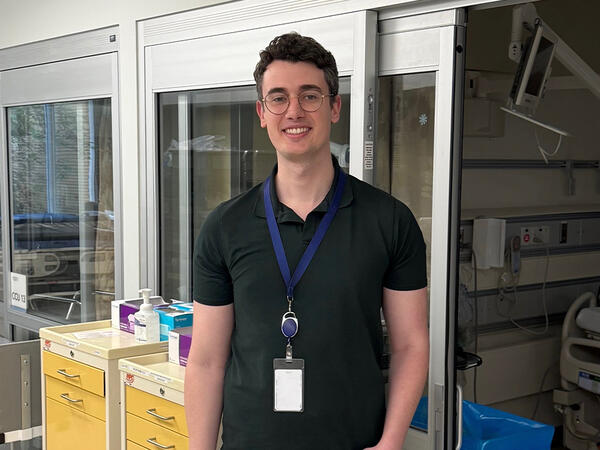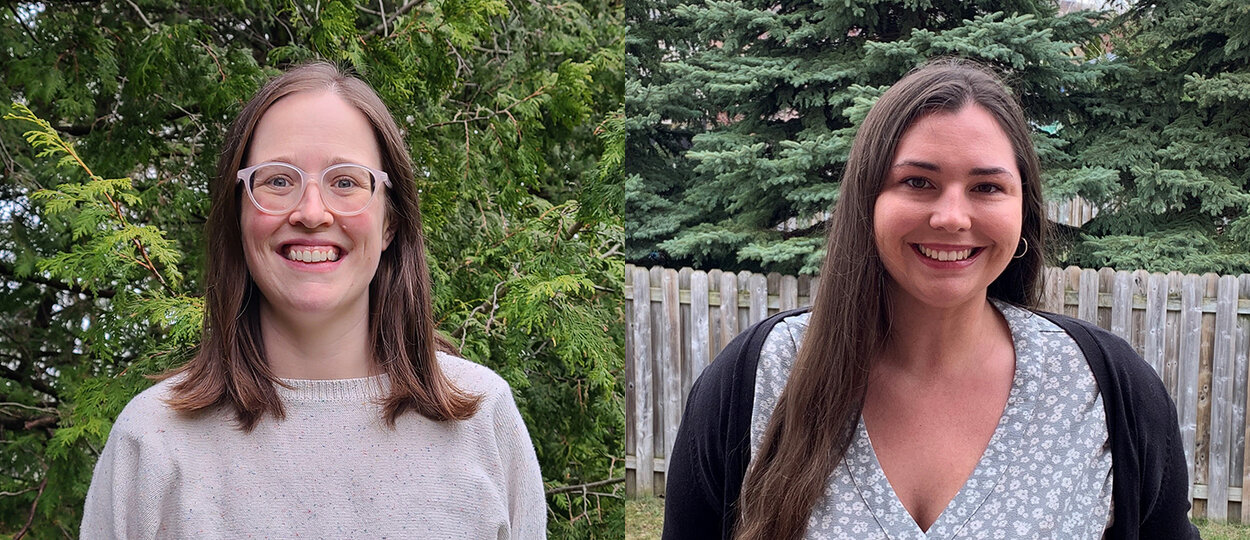From left: 0T9 alumna Sandra Zaikos and 2T2 student Beverly-Ann Oliver
Mental illness and drug interactions can worsen cognition and dementia, but pharmacists’ expertise can help untangle complex cases
Older adults can face the same mental health issues and illnesses as other age groups – from depression and anxiety to schizophrenia and bipolar disorder – along with dementia and declining cognition. But whether worsening mental health symptoms need a new medication, are the result of drug interactions, or related to other conditions is not always clear.
“Medical instability can actually worsen mental health, and each condition has a treatment with potential to interact with other drugs,” says Sandra Zaikos, clinical pharmacist with the North Simcoe Muskoka Specialized Geriatric Service (SGS) and GeriMedRisk, two interprofessional geriatric consultation services. “Sometimes a patient’s poorly controlled dementia or cognitive impairment is a result of their medications, and you may be able to improve their symptoms by simplifying their medication regimen.”
“Every patient is unique with different priorities and perspectives. Incorporating that patient-centred care into a medically complex case with complex drug interactions makes this practice challenging but rewarding.”
Because older adults often take multiple drugs for physical or mental conditions, drugs and interactions that can affect cognition and mental health are a real risk. Pharmacists play crucial roles in identifying these potential interactions and making recommendations about whether to add a medication to treat a condition or deprescribe a medication if it is causing problems.
“Every patient is unique with different priorities and perspectives,” says Zaikos, who graduated from the Leslie Dan Faculty of Pharmacy in 2009 and is now an adjunct lecturer and preceptor in the PharmD program. “Incorporating that patient-centred care into a medically complex case with complex drug interactions makes this practice challenging but rewarding.”
Zaikos works with interprofessional teams that make recommendations about care of complex older adults to nurse practitioners, family doctors or specialists.
In her role with GeriMedRisk, a provincial e-consulation service for clinicians across Ontario, Zaikos is part of a team that handles questions about physical and mental health, focusing on the Simcoe-Muskoka area.
At North Simcoe Muskoka Specialized Geriatric Services, Zaikos focuses on geriatric mental health. Led by a geriatric psychiatrist and including nurses, occupational therapists and other clinicians who specialize in behaviour management, the team meets regularly for rounds to discuss complex cases, which could include situations where a patient has increased aggression or been experiencing delirium. Members of this team also focus on non-pharmacologic interventions; although they do not prescribe medications, Zaikos helps to educate other team members about how drugs and their interactions could be affecting patients’ mental health.
“I look at the patient holistically and help the team to understand how those other medical concerns could be contributing to the psychiatric perspective,” she says. “As pharmacists, our role is to consider medications in patient-centred care and think about how those medications affect the patient and their mental health experience.”
Pharmacists can have real impact on quality of life for older adults
Beverly-Ann Oliver (2T2), a PharmD student at the U of T’s Leslie Dan Faculty of Pharmacy, started her APPE rotation with the North Simcoe Muskoka SGS and GeriMedRisk in February after gaining experience in hospital and community pharmacy through her other rotations. She had always been interested in mental health, specializing in both biology and psychology during her undergraduate degree, and welcomed the opportunity to have a mental health rotation near her hometown of Barrie, Ontario.
With Zaikos as her preceptor, Oliver attended the patient rounds and helped make medication recommendations to optimize care.
“Before this rotation, I wasn’t aware of this kind of role for the pharmacist as part of a consultation service,” says Oliver. “I really enjoyed the level of interprofessional discussion and working on this kind of team.”
Though SGS pharmacists don’t typically work directly with patients, Oliver had the opportunity to shadow the other team members, including attending patient visits with the psychiatrist to see how their recommendations are applied to the patient.
“Geriatric mental health, especially in a rural community, is not talked about a lot and you don’t hear about the resources available,” says Oliver. “I learned so much about the importance of tailoring medications to older adults because, even if someone has been on their medications for years, their body is changing as they age, and their medications may need to as well.”
While there are always more geriatric mental health patients than resources available, the COVID-19 pandemic has worsened the situation, having a significant impact on the mental health of older adults.
In an effort to protect older adults living in long-term care from COVID-19, social interactions at times were nearly non-existent, and residents were isolated to the point that their mental health and cognition suffered, a condition that has been termed “confinement syndrome.” Anecdotally, the SGS team has seen a spike in depression, anxiety, and cognitive decline in older adults throughout the pandemic.
Despite the many challenges of working in geriatric mental health, both Zaikos and Oliver enjoy the field and the impact they can have on the lives of their patients.
“If you take the time to listen, you can get insight into what’s going on in their life, all of which can help in supporting them medically.”
“This is a patient population where picking up a drug interaction or problem can really help someone to feel and do better, get their quality of life back, stay at home longer and have improved mental health. The impact can be huge and rewarding,” says Zaikos.
She advises that all pharmacists who work with older adults in any specialty take the time to listen to and centre the patient, regardless of their cognition or mental health, which can help pharmacists pick up undetected mental health issues or drug side effects.
“Especially in a community pharmacy, you’re a trusted person, and patients are often comfortable sharing their life stories and experiences with you,” she says. “If you take the time to listen, you can get insight into what’s going on in their life, all of which can help in supporting them medically.”
With her education now complete, Oliver hopes to find a hospital or clinical role in either mental health or geriatrics, though her priority is practising in a rural area. “Focusing on older adults is so important, especially in these rural communities where there is a large geriatric population,” she says. “Whatever my practice becomes, I will likely be working with a lot of older adults, and this rotation has helped prepare me.”
More News
Image

Welcoming Ivy Lam as Academic Lead in Climate, Health & Sustainable Care
Assistant Professor Lam will guide the Leslie Dan Faculty of Pharmacy's efforts to embed environmental sustainability across the Faculty.
Read More
Image

Pharmacy alum’s research shows how full-scope practice improves cancer care
Honoured with a national award, Adrian de Boer says his residency experience was a powerful reminder that he's making a meaningful change to the pharmacy profession.
Read More
Image

Pharmacy alum passionate about helping community pharmacists practice to full scope
As a pharmacy leader at Rexall, Heidi Wittke uses frontline experience to lead initiatives that improve patient care
Read More
